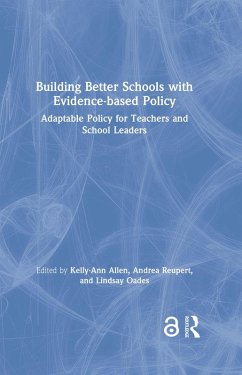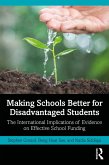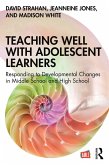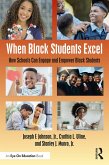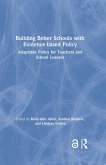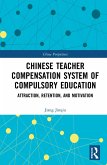Building Better Schools with Evidence-based Policy (eBook, PDF)
Adaptable Policy for Teachers and School Leaders
Redaktion: Allen, Kelly-Ann; Oades, Lindsay; Reupert, Andrea
0,00 €
0,00 €
inkl. MwSt.
Sofort per Download lieferbar

0 °P sammeln
0,00 €
Als Download kaufen

0,00 €
inkl. MwSt.
Sofort per Download lieferbar

0 °P sammeln
Jetzt verschenken
Alle Infos zum eBook verschenken
0,00 €
inkl. MwSt.
Sofort per Download lieferbar
Alle Infos zum eBook verschenken

0 °P sammeln
Building Better Schools with Evidence-based Policy (eBook, PDF)
Adaptable Policy for Teachers and School Leaders
Redaktion: Allen, Kelly-Ann; Oades, Lindsay; Reupert, Andrea
- Format: PDF
- Merkliste
- Auf die Merkliste
- Bewerten Bewerten
- Teilen
- Produkt teilen
- Produkterinnerung
- Produkterinnerung

Bitte loggen Sie sich zunächst in Ihr Kundenkonto ein oder registrieren Sie sich bei
bücher.de, um das eBook-Abo tolino select nutzen zu können.
Hier können Sie sich einloggen
Hier können Sie sich einloggen
Sie sind bereits eingeloggt. Klicken Sie auf 2. tolino select Abo, um fortzufahren.

Bitte loggen Sie sich zunächst in Ihr Kundenkonto ein oder registrieren Sie sich bei bücher.de, um das eBook-Abo tolino select nutzen zu können.
Building Better Schools with Evidence-based Policy: Adaptable Policy for Teachers and School Leaders provides an extensive set of free-to-use policies for building better schools. This is a practical innovation and an example of how schools can use research-evidence in their day-to-day practices.
- Geräte: PC
- ohne Kopierschutz
- eBook Hilfe
- Größe: 9.46MB
Andere Kunden interessierten sich auch für
![Making Schools Better for Disadvantaged Students (eBook, PDF) Making Schools Better for Disadvantaged Students (eBook, PDF)]() Stephen GorardMaking Schools Better for Disadvantaged Students (eBook, PDF)39,95 €
Stephen GorardMaking Schools Better for Disadvantaged Students (eBook, PDF)39,95 €![Lead with Truth (eBook, PDF) Lead with Truth (eBook, PDF)]() Qiana O'LearyLead with Truth (eBook, PDF)28,95 €
Qiana O'LearyLead with Truth (eBook, PDF)28,95 €![Teaching Well with Adolescent Learners (eBook, PDF) Teaching Well with Adolescent Learners (eBook, PDF)]() David StrahanTeaching Well with Adolescent Learners (eBook, PDF)33,95 €
David StrahanTeaching Well with Adolescent Learners (eBook, PDF)33,95 €![When Black Students Excel (eBook, PDF) When Black Students Excel (eBook, PDF)]() Joseph F. Johnson Jr.When Black Students Excel (eBook, PDF)28,95 €
Joseph F. Johnson Jr.When Black Students Excel (eBook, PDF)28,95 €![British Public Schools (eBook, PDF) British Public Schools (eBook, PDF)]() British Public Schools (eBook, PDF)31,95 €
British Public Schools (eBook, PDF)31,95 €![Building Better Schools with Evidence-based Policy (eBook, ePUB) Building Better Schools with Evidence-based Policy (eBook, ePUB)]() Building Better Schools with Evidence-based Policy (eBook, ePUB)0,00 €
Building Better Schools with Evidence-based Policy (eBook, ePUB)0,00 €![Chinese Teacher Compensation System of Compulsory Education (eBook, PDF) Chinese Teacher Compensation System of Compulsory Education (eBook, PDF)]() Jiang JinqiuChinese Teacher Compensation System of Compulsory Education (eBook, PDF)42,95 €
Jiang JinqiuChinese Teacher Compensation System of Compulsory Education (eBook, PDF)42,95 €-
-
-
Building Better Schools with Evidence-based Policy: Adaptable Policy for Teachers and School Leaders provides an extensive set of free-to-use policies for building better schools. This is a practical innovation and an example of how schools can use research-evidence in their day-to-day practices.
Dieser Download kann aus rechtlichen Gründen nur mit Rechnungsadresse in A, B, BG, CY, CZ, D, DK, EW, E, FIN, F, GR, HR, H, IRL, I, LT, L, LR, M, NL, PL, P, R, S, SLO, SK ausgeliefert werden.
Produktdetails
- Produktdetails
- Verlag: Taylor & Francis eBooks
- Seitenzahl: 346
- Erscheinungstermin: 29. April 2021
- Englisch
- ISBN-13: 9781000362930
- Artikelnr.: 61530703
- Verlag: Taylor & Francis eBooks
- Seitenzahl: 346
- Erscheinungstermin: 29. April 2021
- Englisch
- ISBN-13: 9781000362930
- Artikelnr.: 61530703
- Herstellerkennzeichnung Die Herstellerinformationen sind derzeit nicht verfügbar.
Kelly-Ann Allen is a board-endorsed Educational and Developmental Psychologist and senior lecturer within the School of Education, Monash University (Educational Psychology and Inclusion). Kelly-Ann is a Senior Fellow (Honorary) of the Centre for Positive Psychology, Melbourne Graduate School of Education, University of Melbourne, and is the inaugural director and founder of the International Belonging Research Laboratory and Global Belonging Collaborative, which represents a large group of belonging researchers from around the world. She is the Editor-in-Chief of the Educational and Developmental Psychologist and The Journal of Belonging and Human Connection. Andrea Reupert is a Professor at Monash University, Clayton and Director of Psychological Programs at the Krongold Clinic. Andrea's area of expertise is in the promotion of young people's mental health and the role of schools and other services in mental health promotion, prevention, and early intervention. Along with her team, and in consultation with parents and children, she has developed various evidence-based interventions for families and other professional development resources for various practitioners, including teachers. Lindsay Oades is a Professor and Director of the Centre for Positive Psychology at the Melbourne Graduate School of Education, The University of Melbourne, Australia. With over 130 publications, Lindsay's research and scholarship in wellbeing science spans the health, organizational, and education sectors. He is currently a coordinating lead author on a UNESCO Education Assessment examining the relationship between education and flourishing.
Chapter 1. Implementing School Policy Effectively. Chapter 2. Reading
Instruction and Support. Chapter 3. Student Wellbeing Interventions and
Implementation. Chapter 4. Load Reduction Instruction Policy. Chapter 5.
Personalised Wellbeing Planning. Chapter 6. Play Policy Framework for
Schools. Chapter 7. Excellence in Indigenous Education. Chapter 8. Alcohol
and Other Drug Use. Chapter 9. Feedback for Learning. Chapter 10. Activity
Participation Policy. Chapter 11. Embedded Careers Education. Chapter 12.
Appropriate Staff and Student Relationships Policy. Chapter 13.
Self-injury Response and Intervention Policy. Chapter 14. School
Trauma-Informed Practice Policy. Chapter 15. Mental Health Promotion
Policy. Chapter 16. Applying the Science of Learning in the Classroom.
Chapter 17. Catering for Gifted and Talented Students in the Regular
Classroom. Chapter 18. Teachers' Use of Digital Technologies. Chapter 19.
School Belonging Policy. Chapter 20. Apps for Secondary School Student
Mental Health and Wellbeing. Chapter 21. School Cultural Congruity.
Chapter 22. Inclusive Education for Students from Refugee or Migrant
Backgrounds. Chapter 23. Teacher Wellbeing. Chapter 24. The Use of Digital
Devices in the Classroom. Chapter 25. Transgender and Non-binary Students,
Staff, and Family Members in Schools. Chapter 26. Family Engagement.
Chapter 27. A Whole School Approach to Preventing and Managing Bullying.
Chapter 28. Policy Framework for the Use of Therapy Dogs in Educational
Settings. Chapter 29. Establishing Effective School and Community
Collaborations to Prevent Student Homelessness. Chapter 30. Responding to
Students Living with Domestic and Family Violence. Chapter 31. Promoting
Educational Equity for Students from Socioeconomically Disadvantaged
Backgrounds. Chapter 32. Using Research Evidence to Improve Practice.
Chapter 33. Declaring a Climate Emergency. Chapter 34. Entrepreneurial
Learning and Student-driven Learning. Chapter 35. Screening and Assessment
of Learning. Chapter 36. Strengths-Based Approaches for Assessing Student
Well-Being. Chapter 37. Data-based assessment of psychological well-being
in whole school environments. Chapter 38. School-Based Empathy Policy: A
holistic approach. Chapter 39. Raising Awareness and Understanding of
Superdiversity in the classroom. Chapter 40. School Policy Development and
Creation
Instruction and Support. Chapter 3. Student Wellbeing Interventions and
Implementation. Chapter 4. Load Reduction Instruction Policy. Chapter 5.
Personalised Wellbeing Planning. Chapter 6. Play Policy Framework for
Schools. Chapter 7. Excellence in Indigenous Education. Chapter 8. Alcohol
and Other Drug Use. Chapter 9. Feedback for Learning. Chapter 10. Activity
Participation Policy. Chapter 11. Embedded Careers Education. Chapter 12.
Appropriate Staff and Student Relationships Policy. Chapter 13.
Self-injury Response and Intervention Policy. Chapter 14. School
Trauma-Informed Practice Policy. Chapter 15. Mental Health Promotion
Policy. Chapter 16. Applying the Science of Learning in the Classroom.
Chapter 17. Catering for Gifted and Talented Students in the Regular
Classroom. Chapter 18. Teachers' Use of Digital Technologies. Chapter 19.
School Belonging Policy. Chapter 20. Apps for Secondary School Student
Mental Health and Wellbeing. Chapter 21. School Cultural Congruity.
Chapter 22. Inclusive Education for Students from Refugee or Migrant
Backgrounds. Chapter 23. Teacher Wellbeing. Chapter 24. The Use of Digital
Devices in the Classroom. Chapter 25. Transgender and Non-binary Students,
Staff, and Family Members in Schools. Chapter 26. Family Engagement.
Chapter 27. A Whole School Approach to Preventing and Managing Bullying.
Chapter 28. Policy Framework for the Use of Therapy Dogs in Educational
Settings. Chapter 29. Establishing Effective School and Community
Collaborations to Prevent Student Homelessness. Chapter 30. Responding to
Students Living with Domestic and Family Violence. Chapter 31. Promoting
Educational Equity for Students from Socioeconomically Disadvantaged
Backgrounds. Chapter 32. Using Research Evidence to Improve Practice.
Chapter 33. Declaring a Climate Emergency. Chapter 34. Entrepreneurial
Learning and Student-driven Learning. Chapter 35. Screening and Assessment
of Learning. Chapter 36. Strengths-Based Approaches for Assessing Student
Well-Being. Chapter 37. Data-based assessment of psychological well-being
in whole school environments. Chapter 38. School-Based Empathy Policy: A
holistic approach. Chapter 39. Raising Awareness and Understanding of
Superdiversity in the classroom. Chapter 40. School Policy Development and
Creation
Chapter 1. Implementing School Policy Effectively. Chapter 2. Reading
Instruction and Support. Chapter 3. Student Wellbeing Interventions and
Implementation. Chapter 4. Load Reduction Instruction Policy. Chapter 5.
Personalised Wellbeing Planning. Chapter 6. Play Policy Framework for
Schools. Chapter 7. Excellence in Indigenous Education. Chapter 8. Alcohol
and Other Drug Use. Chapter 9. Feedback for Learning. Chapter 10. Activity
Participation Policy. Chapter 11. Embedded Careers Education. Chapter 12.
Appropriate Staff and Student Relationships Policy. Chapter 13.
Self-injury Response and Intervention Policy. Chapter 14. School
Trauma-Informed Practice Policy. Chapter 15. Mental Health Promotion
Policy. Chapter 16. Applying the Science of Learning in the Classroom.
Chapter 17. Catering for Gifted and Talented Students in the Regular
Classroom. Chapter 18. Teachers' Use of Digital Technologies. Chapter 19.
School Belonging Policy. Chapter 20. Apps for Secondary School Student
Mental Health and Wellbeing. Chapter 21. School Cultural Congruity.
Chapter 22. Inclusive Education for Students from Refugee or Migrant
Backgrounds. Chapter 23. Teacher Wellbeing. Chapter 24. The Use of Digital
Devices in the Classroom. Chapter 25. Transgender and Non-binary Students,
Staff, and Family Members in Schools. Chapter 26. Family Engagement.
Chapter 27. A Whole School Approach to Preventing and Managing Bullying.
Chapter 28. Policy Framework for the Use of Therapy Dogs in Educational
Settings. Chapter 29. Establishing Effective School and Community
Collaborations to Prevent Student Homelessness. Chapter 30. Responding to
Students Living with Domestic and Family Violence. Chapter 31. Promoting
Educational Equity for Students from Socioeconomically Disadvantaged
Backgrounds. Chapter 32. Using Research Evidence to Improve Practice.
Chapter 33. Declaring a Climate Emergency. Chapter 34. Entrepreneurial
Learning and Student-driven Learning. Chapter 35. Screening and Assessment
of Learning. Chapter 36. Strengths-Based Approaches for Assessing Student
Well-Being. Chapter 37. Data-based assessment of psychological well-being
in whole school environments. Chapter 38. School-Based Empathy Policy: A
holistic approach. Chapter 39. Raising Awareness and Understanding of
Superdiversity in the classroom. Chapter 40. School Policy Development and
Creation
Instruction and Support. Chapter 3. Student Wellbeing Interventions and
Implementation. Chapter 4. Load Reduction Instruction Policy. Chapter 5.
Personalised Wellbeing Planning. Chapter 6. Play Policy Framework for
Schools. Chapter 7. Excellence in Indigenous Education. Chapter 8. Alcohol
and Other Drug Use. Chapter 9. Feedback for Learning. Chapter 10. Activity
Participation Policy. Chapter 11. Embedded Careers Education. Chapter 12.
Appropriate Staff and Student Relationships Policy. Chapter 13.
Self-injury Response and Intervention Policy. Chapter 14. School
Trauma-Informed Practice Policy. Chapter 15. Mental Health Promotion
Policy. Chapter 16. Applying the Science of Learning in the Classroom.
Chapter 17. Catering for Gifted and Talented Students in the Regular
Classroom. Chapter 18. Teachers' Use of Digital Technologies. Chapter 19.
School Belonging Policy. Chapter 20. Apps for Secondary School Student
Mental Health and Wellbeing. Chapter 21. School Cultural Congruity.
Chapter 22. Inclusive Education for Students from Refugee or Migrant
Backgrounds. Chapter 23. Teacher Wellbeing. Chapter 24. The Use of Digital
Devices in the Classroom. Chapter 25. Transgender and Non-binary Students,
Staff, and Family Members in Schools. Chapter 26. Family Engagement.
Chapter 27. A Whole School Approach to Preventing and Managing Bullying.
Chapter 28. Policy Framework for the Use of Therapy Dogs in Educational
Settings. Chapter 29. Establishing Effective School and Community
Collaborations to Prevent Student Homelessness. Chapter 30. Responding to
Students Living with Domestic and Family Violence. Chapter 31. Promoting
Educational Equity for Students from Socioeconomically Disadvantaged
Backgrounds. Chapter 32. Using Research Evidence to Improve Practice.
Chapter 33. Declaring a Climate Emergency. Chapter 34. Entrepreneurial
Learning and Student-driven Learning. Chapter 35. Screening and Assessment
of Learning. Chapter 36. Strengths-Based Approaches for Assessing Student
Well-Being. Chapter 37. Data-based assessment of psychological well-being
in whole school environments. Chapter 38. School-Based Empathy Policy: A
holistic approach. Chapter 39. Raising Awareness and Understanding of
Superdiversity in the classroom. Chapter 40. School Policy Development and
Creation
